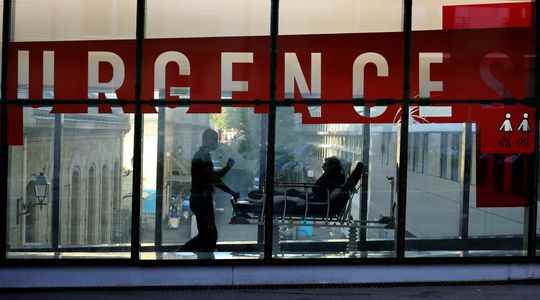In normal times (if there is still one in the hospital), the teams of Dr Prudhomme, regulating doctor at Samu 93, are supposed to pick up calls made to 15 in a maximum of one minute. A necessary quality criterion in the event of an alert for a heart attack, a heart attack or a serious accident. “Lately, our averages have not been good, we rather pick up after four or even five minutes, he worries with L’Express. We are seeing a 10% to 20% increase in calls to the Samu in direct correlation with episodes of high heat”.
Among this incessant flood of calls, the Parisian doctor mainly notes patients affected by high heat with chronic pathologies, such as heart failure, kidney failure or hypertension. “The treatments for these pathologies do not mix well with the heat, and generally in the event of a heat wave they must be revised downwards, but many people do not know it, he explains. And to add: “In France, we have big problems on the issue of drug education, and once again the burden falls on the hospital.”
Tensions on hospital beds
For Professor Frédéric Adnet, head of the emergency department at the Avicennes hospital in Bobigny (93) and medical director of the Samu de Seine-Saint-Denis, “the health impact of this heat wave is manageable. Although the capacity of the he hospital having been reduced in recent times, the patients admitted for heatstroke have reduced the possibilities for other pathologies”. In Bobigny, Professor Adnet estimates the increase in attendance linked to the heatwave episode at 15%. At the same time, 30% of the hospital beds are closed. “Which is not without generating some tensions in terms of the possibilities of hospitalization”.
In the south-east, Jérémy Chanchou, an emergency nurse at the Arles hospital center, also noted an increase in hospital visits. “During the heatwave episode, we mainly receive dehydrated elderly people, or those with heart failure, he reports. We also see children arriving, who are just as fragile in the face of the heat”. Nevertheless, the influx is out of all proportion to the heat wave of 2003. “In nursing homes, prevention, communication and surveillance have evolved a lot, he adds. this carnage effect that we experienced 19 years ago”.
In Bordeaux, caregivers concerned about fires
In Bordeaux, it is less the episode of heat wave “rather well managed in terms of prevention” which worries than that of the fires in the neighboring municipalities of La Teste-de-Buch and Landiras. “We hold our breath”, confides Philippe Revel, head of the emergency department at the CHU of the Pellegrin hospital (whose department is still partially closed at night for lack of staff). “We are very concerned about the fires because of the potential for an influx of patients related to smoke toxicities”. For the time being, the Bordeaux hospital has not taken care of any injuries related to the fires. However, it was necessary to organize the evacuation and relocation of around fifty residents of a nursing home in Pilat threatened by fire.
In the Aude, in Carcassonne, Yves-Michel Etchepare, emergency physician and head of the departmental Samu, also observes an increase in attendance of 20 to 30%, or even double on the coast, near Narbonne. “With us, in the tourist area, it’s the same every year, he says. The problem is that this year, more than the others, we are on the razor’s edge because of the shortage of caregivers and the Covid that comes back”. Instead of four doctors in the emergency room, there are three of them. “And all this without closing the Smur (mobile emergency and resuscitation service)…”
“We made people wait outside, sometimes sitting on the ground”
On the wire, the emergencies of the hospital center of Saint-Nazaire are also. “For two weeks, it’s been very complicated, confides Karine * who prefers to testify on condition of anonymity. “For lack of places on the floors of the hospital and in the peripheral structures, patients stagnate in the emergency room and waiting times are getting longer”. According to hospital management, the week of July 14 experienced a peak in reception with 1,600 passages, or 400 more than normal.
The situation was so critical that on July 15, the family waiting room had to be transformed into a box for patients. “We installed stretchers and we treated them there, in the middle”, testifies the nurse who also says that the car park has in turn been transformed into a waiting room. “Do you realize, we made people wait outside, sometimes sitting on the ground”. The increase in activity is mainly correlated with summer activity, more so than the heat wave in the Loire-Atlantique department. “Fortunately the heat had no effect, because I doubt that we would have been able to take care of these patients”.
